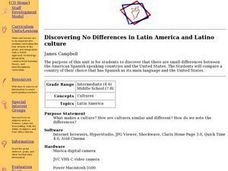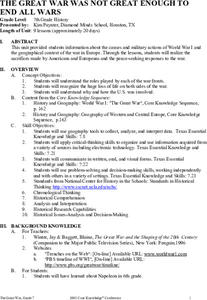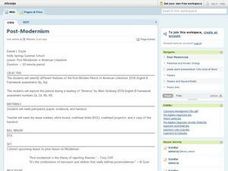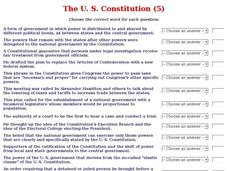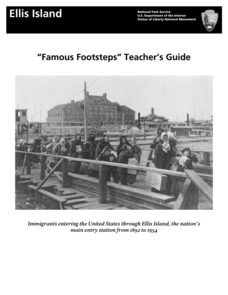Curated OER
Discovering No Differences in Latin America and Latino Culture
Students explore the differences between American Spanish speaking countries and the United States. Students explore the history and culture of Spanish speaking countries. They examine Latino influences. Students create a presentation...
Curated OER
Sowing Seeds of the Future
Students explore how to preserve native wild plants and garden crops. In this science lesson, students play the role of botanists and research North American plants. Students create a presentation about their findings.
Curated OER
Justice in America
Eleventh graders analyze primary sources for evidence of intent and purpose. In this American government instructional activity, 11th graders compose a one-page response explaining their understanding of "justice." Students read and...
Curated OER
The Great War Was Not Great Enough To End All Wars
Students examine the causes and military actions of World War I. In this World History lesson, students study the sacrifices made by Americans and Europeans. Students read and analyze primary sources related to World War I....
Curated OER
War and International Law:America’s Foreign Policy: A Brief History
Students discover the history of American foreign policy. In this foreign policy activity, students listen to their instructor present a lecture that presents a brief history of American foreign policy. Students respond to...
Curated OER
Society in the 1950s (5)
In this online interactive American history worksheet, students respond to 8 matching questions regarding 1950's America. Students may check their answers immediately.
Curated OER
Langston Hughes: Artist and Historian
Students examine the life and works of Langston Hughes. In groups, they research the characteristics of the Harlem Renaissance and how Hughes' poems relate to the era. They use the themes in his writings and relate it to the Great...
Curated OER
Jewish Culture Through Food Recipes
Young scholars engage in studying Jewish culture through the experience of tasting and eating different foods. They answer key questions that are used to guide the activity. The foods of Americans is contrasted with the Jewish foods.
Curated OER
The Cherokee: The Principal People (Ani-Yunwiya), 1700 - 1838
Young scholars read passages and research the Cherokee Tribe and write an account of a typical day as a Cherokee Native American. In this Cherokee lesson plan, students listen to Cherokee music, read Cherokee passages, fill out...
Curated OER
Migration During the Great Depression: Living History
Students interview immigrants of Central Florida and photograph them to learn their oral history and life stories. In this immigration lesson plan, students discover where people come from, and write about the life story of this person.
Curated OER
Abuela's Weave Teacher's Guide
Students read and response to the book, Abuela's Weave. In this African-American literature lesson, students discuss pre-reading questions, that focus on family traditions and make predictions about the text. Students read the text and...
Curated OER
The Monroe Doctrine: U.S. Foreign Affairs (circa 1782-1823) and James Monroe
Students read the test of the Monroe Doctrine then list the key points and discuss its central tenets.
Curated OER
Post- Modernism
Students participate in a lesson that investigates post-modernism in American literature. They conduct the lesson with the help of reading "America" by Ginsberg to create context. Then students define the genre and the culture that has...
Curated OER
The U. S. Constitution (5)
In this online interactive American history worksheet, students answer 17 fill in the blank questions regarding the U. S. Constitution. Students may submit their answers to be scored.
Curated OER
The Rise of Big Business & the Labor Movement (6)
In this online interactive American history worksheet, students answer 13 fill in the blank questions regarding the rise of big business and the labor movement. Students may submit their answers to be scored.
Benjamin Franklin Tercentenary
Classroom Constitutional Convention
Students investigate the eight phrases that comprise the Preamble to the U.S. Constitution to determine its principles and purpose. Their own Constitutional Convention is convened to craft a preamble for their school's governance.
National Endowment for the Humanities
Faulkner's As I Lay Dying: Images of Faulkner and the South
Learners research one aspect of the life of Faulkner and the culture of the South. For this As I Lay Dying instructional activity, learners explore a webpage on Faulkner and write a summary. Learners analyze the images...
Curated OER
Gran Quivira: A Blending of Cultures in a Pueblo Indian Village
Students examine the changing life ways of the inhabitants of a Pueblo Indian village from the 7th century to the arrival of the Spanish in the early 17th century. They explain the influence of Spanish missionaries on the lives the...
Curated OER
Daniel Shays and the Constitution
Students contrast the diverse views of Connecticut River Valley people in the years before, during, and after the Revolution.
Curated OER
Everybody Celebrates
Examine the holidays of La Posada in Mexico, Hanukkah in Israel, and Kwanzaa in the United States. Learners identify the countries on a world map, listen to stories, create art projects for each holiday, and make recipes celebrating...
National Endowment for the Humanities
Family Voices In As I Lay Dying
Learners analyze William Faulkner's 'As I Lay Dying' and his use of multiple voices. In this William Faulkner lesson plan, students analyze Faulkner's use of multiple voices in narration. Learners examine the Bundren family through the...
National Endowment for the Humanities
Faulkner's As I Lay Dying: Crossing the River
Students analyze the multiple voices in William Faulkner's As I Lay Dying. In this multiple voices lesson plan, students explore the use of symbolism with the narrative voices of the text. Students write a detailed profile of one...
Curated OER
Freedom and Dignity Project
Students research the economic impact of the Revolutionary War on a variety of occupations. They examine and discuss the topic of whether political leanings influenced the economic outlook.
National Park Service
“Famous Footsteps” Teacher’s Guide
As part of a study of Ellis Island Immigration Station, class members assume the role of immigration service workers, investigate the dossier of an immigrant, and recommend whether or not their subject should be allowed to enter the US....
Other popular searches
- Central American History
- Central American Immigration
- Central American Author
- Central American Culture
- Central American Artist
- Central American Money
- Central American Countries
- Central American Geography
- Central American Maps
- \"Central American History\
